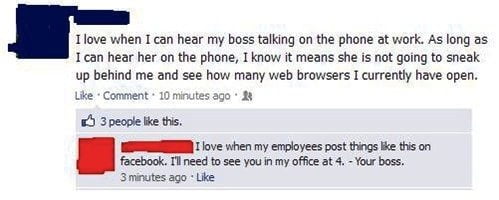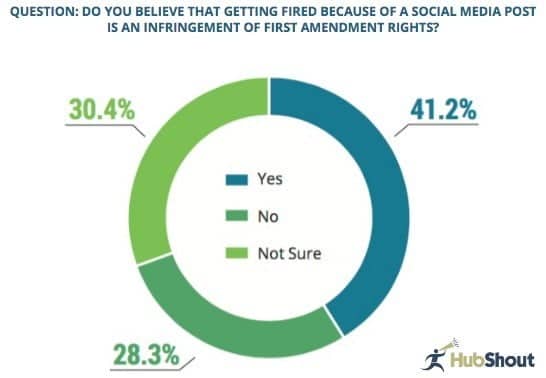
When it comes to workplace etiquette in 2016, how you present yourself online is just as important as how you present yourself in the office.
Gone are the days of venting on MySpace about your boss being “wack” or putting up an “out of the office” message referencing your “totally bogus” coworkers. If you want to complain about your job and stay employed, keep it offline. Take the more professional highroad and just mumble under your breath like everyone else.
We are all so connected nowadays that your employer can see virtually anything you post online in a matter of seconds. Even if you aren’t “friends” on Facebook, following each other on Twitter, or connected on LinkedIn, chances are, whatever negative thing you post will get back to your boss and potentially cost you your job, and even your career.
Before the Job
Most people—hopefully—are aware enough to at least remove all the pictures of them funneling beer with their shirts off when they’re in the process of searching for a job. It’s now common knowledge that employers are going to take a look at your social media pages to see if you’re mature enough for a particular job.
However, prospective employers aren’t necessarily searching for negatives on your social media pages.
“What candidates do in their spare time and broadcast to the world through social media speaks volumes about their personal values and culture,” said Val Matta, vice president of business development at CareerShift. “The hiring manager knows that, in hiring that person, they’ll likely bring those values and culture into the office. So it must align with, or contribute positively to, the organization’s current culture.”
According to HubShout’s 2016 Social Media Conduct study, there are five social media factors that hiring managers look for when determining if a prospective employee is hirable or not:
- Background Info – Whether or not the candidate’s background information supports the specific job requirements and qualifications.
- Personality – Whether or not the candidate’s personality aligns with the company’s culture.
- Professionalism – Whether or not the candidate shows a professional image online.
- Communication – How the candidate communicates with others.
- Creativity – What type of content the candidate is posting and if it’s creative or not.
During the Job
Congratulations! You managed to hide your less-than-professional photo albums well enough to land a great new job. Now, you can get back to posting whatever you want on social media, right?
WRONG!
You can get fired for posting something inappropriate on social media. In fact, in 2015, 18% of employers admitted to firing an employee because of something he or she posted online. Here are some of the top social media-related reasons for firing:
- Indecent Content – Posting that F-word-ridden status might make you feel good for 0.2 seconds, but once your employer reads that post, you’re not going to be all that happy.
- Inappropriate Photos – Perhaps the most unprofessional thing to do on social media is to post ill-advised pictures of yourself and others.
- Sharing Confidential Information About Your Company – If you’re going to talk about work on social media, make sure you know what you can and can’t talk about.
- Bad-Mouthing Your Boss – Talking about how much you hate your boss or your job is a great way to lose the very thing you’re complaining about, especially if your boss can see what you post…

But what about the First Amendment? I can say whatever I want!
Ah, yes, the Freedom of Speech argument. Sadly, far too many people believe the First Amendment can protect them from being fired over something they post on social media.
Again, WRONG!
Roughly 41% of Americans believe that getting fired over a social media post is an infringement of their First Amendment right. Another 30% are not sure whether it’s an infringement or not. So that’s 71% of Americans who are unaware that the First Amendment does not apply to social media when it comes to employment.

The First Amendment Right to Freedom of Speech allows people to speak freely without government interference. Employers, on the other hand, can step in at anytime and fire an employee because of inappropriate online activity.
After the Job
Hopefully you left on good terms and not because of the very reasons we’re talking about. You’re not out of the woods just yet, however, unless you are hoping to never work again. In that case, have at it online.
But if you do want to actually continue earning a living, it’s best to continue acting in a professional manner on social media. Talking poorly about your previous employer, or any employee at the company, is one of the main reasons hiring managers pass on potential candidates.
What to Do?
It seems difficult because there are so many things not to do on social media but it’s really not that hard. All you have to do is be respectful and professional online. If that’s too difficult for you, try just posting funny pet videos—people seem to really enjoy those.
Sean Finucane Is a Premium Content Writer for white label SEO firm, HubShout. He graduated in 2015 from the College at Brockport with a Bachelor’s Degree in Communications.
